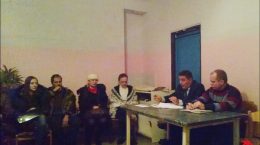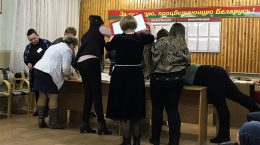-
Background
Belarus is the only country in Europe and of the former Soviet Republics which has not signed the European Charter of Local Self-Government. Belarus’s local government is arranged in three hierarchical tiers: a) six regions and the capital; b) 118 districts and 12 cities; and c) on primary level about 1.300 councils, in which higher councils can override decisions of the lower levels. But even the elected councils of higher tiers have almost no decision-making power: the power rests in the administrative executive committees, whose heads (the so called ‘power vertical’) are directly responsible to the president. This state of affairs was one of the consequences of a referendum of 1996.
Since this notorious popular vote of 1996 not a single election in Belarus was recognised as fair and free. Every election cycle the opposition announces the start of a fight for free and just elections, but still seems to be far away from reaching this goal. Having free and fair elections is one of OH’s main concerns and goals; when we think about it we bear in mind two things. Firstly, if the opposition did not succeed in the twenty-year long struggle for fair elections in Belarus, we should be looking for another way and develop new strategies to meet this goal. Secondly, analyses of the experience of our closest neighbour, Ukraine, demonstrates that even changing the political situation dramatically, through revolution, does not guarantee that all systemic problems will be fixed. On the contrary, systemic issues, that is, the issues that are inherent to the overall political culture, on both normative and practical levels, will persist. OH has set itself a task to influence the overall system today in order to avoid some systemic issues, such as disrespect to certain human rights, later, when democratic forces will be in power.
To sum up, OH decided to build on the mistakes and experience of our colleagues from the democratic camp in both Belarus and abroad, and developed ten evidence-based requests for local representatives and MPs. For three and a half years now OH has been offering, insisting, convincing and monitoring how the elected deputies comply with these demands.
These ten demands are, effectively, a framework of conditions or terms that democratically elected representatives ought to comply with. These requirements include, for example, publication of budget related decisions for public access; publication of decisions made during the council sessions; informing the electorate about the work of the local representatives and MPs; be available for citizens.
These requirements are not strictly speaking ‘political’: OH does NOT demand that the elected representatives stop supporting Alexander Lukashenko or change their political views. The Ten Requirements is a manual (guidelines) that explains how we see, ideally, the work of an elected representative to a local council or Parliament.
An interesting thing is that OH conveys the need to follow this framework to representatives that were elected during unfair and non-free elections; despite that the elects agree to comply with these terms once nobody expects them to change their political affiliation or views.
Presently, these Ten Requirements, introduced by OH, are the only set of the demands developed by an opposition organisation that are consistently complied with by the Belarusian authority. And the key to success here is systematic work with local councils of activists in various towns and cities of Belarus.
In this report we review and sum up the progress with implementation of one of the most important requirements of OH: public access to the local budgets and budget related decisions.
At beginning 2014 initially OH selected twenty one local councils and prepared itself for a long and tedious struggle. We estimated that the most realistic scenario was that after three years of systematic work one of the councils will give in publish a local budget. The results of our campaign to get public access to the local budgets have outdone even our most bold expectations.
-
Progress and Impact:
| Before the campaign of OH |
After the campaign of OH |
| 1991-2013: Not a single local budget was public. | 2014-2017: As per request of the activists of OH there were 60 (sixty) (!) instances of accessible for everyone publications of the local budgets. Including: Local Budgets 2014: 7 (Seven) local budgets for 2014 were published retrospectively: four of them were published in 2016 and three more in 2017; Local Budgets 2015: 11 (Eleven) local budgets were published in 2015; Local Budgets 2016: 19 (Nineteen) local budget-related decisions were made public; 2017: 23 (Twenty three) local budgets were made open for public in 2017. |
| 1991-2016: Zero regional (oblast’) budgets were open to public access. | In 2016 OH added to its target group 6 (six) regional (oblast’) councils. Thus, together with the initial twenty one local councils there were 27 (twenty seven) local councils OH worked with. As a result, in 2017 5 (five) regional budgets were published. Together with other local budgets they constituted the 23 (twenty-three) published budgets mentioned earlier. |
-
Significance and uniqueness of this campaign
-
Accountability
Accountability and transparency of the local politics are important elements of democracy. Without public access to the local budgets neither accountability, nor citizen’s control, and therefore full democracy, are possible.
-
Sustainability
In 2006 OH developed a ‘strategy of small causes’. The strategy was based on the experience demonstrating that citizens were more enthusiastic about civil and political engagement when solving very small local issues and on the idea that in the country where serious political achievements were problematic small victories were very important. This strategy was criticised, although many NGOs use it now. It was a good strategy at the time and still can be used in certain contexts for certain purposes. However, this strategy does not solve systemic problems and does not ensure continuity of citizens’ participation: an individual who forced a municipality to repair the road around her house becomes satisfied with this victory and exits the arena of political engagement. ‘Strategy of small causes’ does not ensure the multiplication effect that OH is after.
This is why OH developed a new strategy: a ‘strategy of sustainable causes’. The idea is to build a system in which a process when started continues to operate. A good example of this is the ‘The Ten Requirements’ Campaign in general and the demand to make local budgets accessible to the public in particular: once the publication of budgets becomes a practice, the authorities will have to explain why they would stop doing it.
We are only on the way to sustainability and we still need support and partnership to achieve a true and long-lasting sustainability in this area. Right now the local councils are waiting whether OH still remembers to check on them and whether it is still necessary to publish their budgets. That is why we intend to continue this work until the publication of the budgets becomes ‘business as usual’.
-
Progress
We consider something a progress if a situation is improving with time. Publication of the local budgets demonstrates, in our view, a sustainable progress: we have started with zero budgets available to the public and twenty one local councils. Now, three and a half years later, there are twenty three budgets available and twenty seven local councils co-operating. Moreover, a number of budgets have been published retrospectively years later. We are certain that if we continue our work we will not only manage to have 100% local budgets published for public access, but also influence the budget-related decisions.
-
Efficacy, True Partnership, and Bottom-up Democracy
We define true partnership in the context of democracy-building in Belarus as a partnership that includes two elements: a) democratic changes are brought about by internal democratic actors in partnership with the EU and b) the Belarusian authority makes concessions under influence of the internal democratic players, which are supported by the EU, but not under influence of international or external bodies. A democratic change promised as a part of negotiations with an international body without a proper involvement of the local civil society becomes a bargaining chip dependent on the good will of the authority. In this case it can be called back at any point, thus creating instability. Most important, it does not address any systemic problem.
‘The Ten Requirements’ campaign is an example that the formula ‘internal actor + EU vs. Belarussian state’ works better and addresses the issues of the system and of its functioning. We strongly believe that Democracy in Belarus is possible only from the inside and bottom-up, and it is highly important to support these processes.
-
Next Steps:
In order to ensure transparency of the local budget-related decision-making and strengthening citizens’ influence on the budget formation, ‘The Ten Requirements’ campaign seeks to achieve the following:
-
Consistency and uniformity of the local budgets made available
Local budgets should be published in accordance with a blueprint, at the same time throughout the country. Access to the public should be provided consistently and without additional effort from OH’s activists.
-
100% access
Public access should be provided to all local budgets annually.
-
Enhancing citizens’ participation in the budget-related decision-making
This includes, firstly, inclusion into the budget expenditures that citizens find socially significant for them. For example, local legislators should consider public requests to build a local clinic or increase expanses aimed at prevention of cancer in regions where statistics show a high level of the disease.
Secondly, as per request of OH, the budgets should be formed in gender sensitive (gender based) manner. I.e. its must be the gender-sensitive budgets. Local gender budgeting is an important element in achieving gender equality in Belarus – the ideal that OH promotes committedly.
Attachment
Comparative table: Publication of Local Budgets (by year):
The local district councils’ budgets for 2014-2017
The table #1
| № | The local council | The budget publications 2014 |
The budget publications 2015 |
The budget publications 2016 |
The budget publications 2017 |
Total for 4 years |
| 1. | Borisov district council | – | – | – | – | 0 |
| 2. | Orsha district council | – | – | + | – | 1 (0+0+1+0) |
| 3. | Mozyr district council | + | + | + | + | 4 (1+1+1+1) |
| 4. | Soligorsk district council | – | + | + | + | 3 (0+1+1+1) |
| 5. | Lida district council | + | + | + | + | 4 (1+1+1+1) |
| 6. | Molodechno district council | – | – | + | + | 2 (0+0+1+1) |
| 7. | Polotsk district council | – | – | + | – | 1 (0+0+1+0) |
| 8. | Zhlobin district council | – | + | + | + | 3 (0+1+1+1) |
| 9. | Svetlogorsk district council | + | + | + | + | 4 (1+1+1+1) |
| 10. | Rechitsa district council | – | + | + | + | 3 (0+1+1+1) |
| 11. | Slutsk district council | + | + | + | + | 4 (1+1+1+1) |
| Common: | 4 | 7 | 10 | 8 |
Currently, 8 local district councils’ budgets of 11 are published.
NO budgets of 3 local district councils for 2017 on the sites of district executive committees (Borisov district council, Orsha district council, Polotsk district council).
The local city councils’ budgets for 2014-2017
The table #2
| № | The local council | The budget publications 2014 |
The budget publications 2015 |
The budget publications 2016 |
The budget publications 2017 |
Total for 4 years |
| 1. | Minsk city council | + | – | + | + | 3 (1+0+1+1) |
| 2. | Gomel city council | – | – | + | + | 2 (0+0+1+1) |
| 3. | Mogilev city council | – | + | + | + | 3 (0+1+1+1) |
| 4. | Vitebsk city council | + | + | + | + | 4 (1+1+1+1) |
| 5. | Grodno city council | + | – | + | + | 3 (1+0+1+1) |
| 6. | Brest city council | – | + | + | + | 3 (0+1+1+1) |
| 7. | Bobrujsk city council | – | – | + | + | 2 (0+0+1+1) |
| 8. | Baranovichy city council | – | – | – | + | 1 (0+0+0+1) |
| 9. | Pinsk city council | – | – | + | + | 2 (0+0+1+1) |
| 10. | Novopolotsk city council | – | + | + | + | 3 (0+1+1+1) |
| Common: | 3 | 4 | 9 | 10 |
There are all budgets of local city councils for 2017 are published.
The local regional councils’ budgets for 2014-2017
The table #3
| № | The local council | OH did not work there | OH did not work there | OH did not work there | The budget publication 2017 (after June) |
Total for the year |
| 1. | Minsk regional council | – | – | – | – | 0 |
| 2. | Gomel regional council | – | – | – | + | 1 |
| 3. | Mogilev regional council | – | – | – | + | 1 |
| 4. | Vitebsk regional council | – | – | – | + | 1 |
| 5. | Grodno regional council | – | – | – | + | 1 |
| 6. | Brest regional council | – | – | – | + | 1 |
| Common: | 0 | 0 | 0 | 5 |
Currently, 5 local regional councils’ budgets of 6 are published.
There is no budget of the Minsk regional council for 2017.







